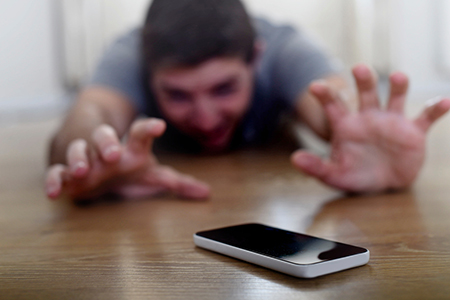(TNS)—The other day, panicked and alarmed by my forgetfulness, I raced back home to retrieve my bosom buddy and constant companion: my smartphone. I couldn’t bear to be without it for two hours.
“Forgot the phone!” I announced sheepishly to the hubby as I dashed through the front door. He arched an eyebrow. When I found the device on the kitchen counter, I smiled in gratitude and relief, a starving sailor sighting a buffet table.
The 12-mile round trip was totally unnecessary. I didn’t get a single call or text in the time I was gone. But that’s beside the point.
Here’s what truly matters: I think I’m addicted to my smartphone. I check it as soon as I get up and before I go to bed, while riding in the car and when I scamper to a public restroom to “freshen up.” This very minute it’s sitting next to the keyboard, where I can keep an eye on the black screen, just in case.
I didn’t realize I might have this obsession until a friend begged her husband to deliver a forgotten phone to the restaurant where we were enjoying a girls’ happy hour. I would’ve made the same request and not felt weird about it.
Almost two thirds of American adults now own a smartphone, up from 35 percent just five years ago. We use it for directions, to connect with far-flung children and grandchildren, to keep up with the news, to listen to music, to play games, to find restaurants and to do just about anything that once required paper and lots more physical effort. Now that small screen, with its beeps, ringtones and customized alerts, has taken over our lives, if not our brains. (Remember when you used to know everyone’s phone number by heart? No need to anymore.)
Smartphones’ accessibility and usefulness make us feel bereft without them. We’re fearful of missing something—a sports score, an inane text, a silly photo of a friend’s senile dog—if it’s not in our purse or pocket. Walk into any social situation and I bet you’ll find a sizable number of people staring at their screens. Little wonder you’re seeing an increase in “No Cellphone” signs.
More and more experts, writing in a variety of publications, from Psychology Today to Time magazine, have sounded the warning: Smartphones are hurting both our health and relationships. And I’m not referring to the recent spate of Samsung Galaxy Note 7 fires, either.
Research has shown how a phone’s glow short-circuits our sleep and how its constant interruption is rewiring our brains, shortening our attention span and killing our ability to focus. Now chiropractors are reporting an epidemic of “text neck,” damage to the spine caused by spending too much time staring down at our smartphone screens.
Our bad behavior has become so prevalent that that now there’s a term for the rudeness we display when we snub someone in favor of a phone. “Phubbing”—ignoring what’s physically right in front of us for the promise of a virtual reality.
Slowly, guiltily, I’m taking baby steps to wean myself. I’m notching the vibrate button on my phone and scheduling do not disturb hours. Maybe one day, just as the Wild West men left their gun holsters at the door for social occasions, we’ll do the same with our phones at movie theaters, birthday parties, dinner dates and evenings with our spouses.
©2016 Ana Veciana-Suarez
Distributed by Tribune Content Agency, LLC.











